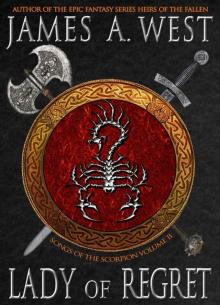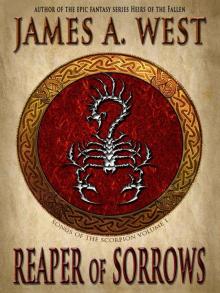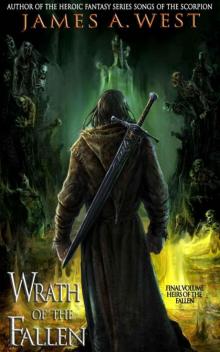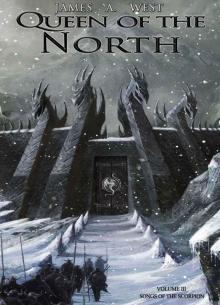- Home
- James A. West
Heirs of the Fallen: Book 02 - Crown of the Setting Sun Page 13
Heirs of the Fallen: Book 02 - Crown of the Setting Sun Read online
Page 13
“To escape, should the need ever arise,” Zera said, kneeling off to one side, “pass into the darkness just below the opening above. There is a fissure there, almost too narrow for even me, that leads out a little over a mile to the west. The way is dank, close, and blacker than any night. Once in, you cannot turn around. I took that way … once. Wriggling along like a blind worm, that single mile took a day and a night to travel.”
Between imagining what such a journey must have been like, and guessing that the need would have to be great indeed to prompt him to take it, Leitos’s eyes drifted shut. When they opened again, the light had changed from golden to ruddy.
“You have been asleep for hours,” Zera said, smiling. She was sitting cross-legged, idly tracing a finger through the sand.
“And you?” Leitos asked groggily.
“I took what rest I needed,” Zera answered, leaving Leitos to wonder if she had slept at all.
“And now we must swim back,” Leitos said, cringing at the memory of the cold water and the dark, breathless passage under the pillar.
“No point waiting,” Zera said with a playful grin.
She hopped to her feet, strode near, and leaned down. Her hair, hanging loose, tickled his nose. Her nearness set his heart to racing, but before he could do anything about it one way or another, she caught him under the arms, lifted him as easily as if he were a babe, and tossed him, squawking, into the pool.
Having made the trip once, the return swim was not nearly as terrifying as before. He popped up at the same time as Zera and paddled quickly, wanting to beat her to dry land. Zera, sensing what he was about, stroked smoothly to the lip of the pool, getting there just ahead of him. As with all she did, she climbed out of the pool with a uncanny grace, then stood waiting for him, water sluicing over her skin.
Mildly disgruntled, Leitos glanced at her hand held out to help him up. With a conceding nod, he took her hand. Before she could settle her feet, he abruptly jerked backward. Startled, Zera yelped as she flew over his head. Even before the echoing sound of her splash fled the rocky chamber, Leitos hurled himself up and out of the water. He was sitting calmly, as if he had been waiting there for hours, when Zera’s head crested the surface.
Treading water, she gazed at him. The inner light of her eyes danced with some emotion he did not recognize. It scared him a little, that strange fire, so unlike anything he had ever seen, and all the more because of what that radiance hid from him. What is she thinking? he thought, skin prickling.
He barely managed to keep his expression serene, but his heart had tripped into a faster beat. He scooted back when she climbed slowly out of the water, her stare unwavering. She crawled to him faster than he could retreat, the supple muscles of her arms and shoulders flexing and relaxing with every movement.
With a sudden blur of speed she was on him, a breathtaking hunter, him the hapless prey. She loomed, her face inches from his. Her lips stretched, and for a moment gleaming white teeth and twin portals of a green inferno filled his vision.
She abruptly caught the back of his head and drew him close. “Before we sup,” she growled playfully, “I must tend your wounds.”
“W-what?” Leitos rasped, his wounds that last thing on his mind.
“Your hand,” Zera said, sitting back on her heels. One moment she was there, so close his skin still held the memory of her faint heat; the next she had moved away, leaving him with a disturbing sense of loss. Her gaze flickered to his hand.
Leitos blinked rapidly, trying to understand what had just happened. To keep Zera from seeing the confusion in his eyes, he looked down at his hand, the same he had slashed while retrieving his knife when fighting the Alon’mahk’lar. He had forgotten about cutting himself, and during the night the wounds had clotted. Swimming and climbing in and out of the pool had reopened the cuts. Blood, a scrawl of thin reddish ink, stained the pale skin of his palm.
He was still looking at his wounds when Zera moved closer, until their knees touched. Stricken by conflicting thoughts—Is she playing some perverse game? Am I a gullible, self-deceiving fool?—he had not noticed that she had gotten up and returned with supplies. He looked into her face, then quickly away, resolving not to let her ensnare him again by whatever baffling charms she had used before.
Without speaking, she used a rounded wooden rod to grind together a mixture of dried leaves and water in a stone bowl. Once finished, she dipped her fingers into the thick, foul-smelling paste, then daubed a layer on his wounds. Finally, she bandaged his hand with a scrap of faded brown linen. Through it all, her touch was delicate and sure, suggesting she had done the same for others, even herself, many times before.
When at last she glanced up, she did so with a contriteness that troubled Leitos. Hers was not a face made for regrets. “I am sorry I toyed with you,” she said in a rush. Leitos felt a flash of vindication, then tamped it down. He did not want to revel in her apparent shame. She went on.
“A Hunter uses learned skills, but more importantly they employ inborn talents to manipulate their targets. Some of those traits are crude weapons—like Sandros with his great size and fierceness—while others are subtle, and the more deadly for it.”
“Like your beauty,” Leitos said, not thinking about the words until after they had passed his lips. His face flamed.
“Just so,” Zera agreed, flashing a brief smile that was both shy and pained. “I … I would not have—should not have—tempted you so. You and I are friends, and a friend cannot be a target.” Zera hung her head, looking like a vulnerable girl. “It’s just that … well … I have never failed to entice a man to desire, even when I do not try. But you … you seemed not to notice me as … as a woman.”
For a moment Leitos was stunned, his mouth hanging, then he burst out laughing. “Of course I noticed you,” he said, and barely cut himself short from describing all that he had noticed, how even with his eyes closed he could see every tantalizing inch of her. Instead he repeated himself. “I noticed you. I could not have done otherwise.” Even that sounded as if it bordered on lechery rather than praise, so he shut up.
Zera sat up straighter, a serious look on her face. “Again, I am sorry. And, I promise never to attempt to seduce you in jest again.”
Leitos shrugged reflexively, but his heart fell, and he felt more confused than ever.
“After our supper, you can sleep on the cot,” she said, the Hunter once more. “I have rested enough, so I will keep watch.”
As she spoke, she retrieved her garments and hastily drew them on. “We have only a few more hours before we must depart, and a night of hard travel after that. On the morrow, we will reach Zuladah.”
Chapter 19
As the sun rose over Zuladah, Leitos and Zera strode amid an ever-increasing throng of crofters and craftsmen. Trapped in a shallow valley, cloaked in a haze of dust kicked up by its denizens, the city emerged like a wraith escaping a reddish-gold mist. Leitos’s exhaustion evaporated at seeing their destination, so like the bone-towns in construction, but different in that it teemed with life—human life.
Men with sons, women with daughters and suckling babes, all walked at a slow pace. Others utilized burros, oxen, goats, or their own scrawny backs and legs to draw rickety carts stacked with assorted goods.
“All that the city needs, and that which the Faceless One demands in duties, comes by this road,” Zera said. “As well, fishmongers come from the south,” she added, raising a finger to direct his gaze, “from the Sea of Sha’uul.”
His breath caught when he realized that the sunlight glinting in the distance did so off a body of water stretching as far as he could see to the east, and just as far to the west. He knew of seas from his grandfather, namely the Sea of Drakarra, but hearing about so much water and seeing it with your own eyes was another matter entirely. I can even smell it, he thought, understanding now what unfamiliar scent had been tickling his nose half the night.
His wonder ceased when they passed by a trio mad
e up of a man, woman, and boy shambling along at a slower pace than the rest. The man used a switch to goad a slat-ribbed ox hauling a flatbed cart with wobbly, much-mended wheels. The bed bore rows upon rows of carefully stacked pottery. Though young, the man and woman both had stooped backs and cracked, dry hands that looked like they belonged to people much older. This last, Leitos supposed, came from working clay into vessels.
The small family gazed ahead with hollow, hungry eyes, looking neither left nor right. Alerted to their misery, Leitos saw the same wherever he looked. Every face was gaunt. Their skin clung tight against underlying bones. None of them look any different than the men of the mines. He had believed the unchained would be more vital and hale. Instead, all looked a short pace from their own graves.
The road to Zuladah dropped off the gently sloping edge of a long plateau, and Leitos soon lost sight of the distant sea. He wished it were otherwise. Seeing so much water had brought to mind the stories his grandfather had told about the voyage across the Sea of Drakarra, enlivened some slumbering part of him to the idea of sailing those seas. There would be a freedom upon those waters, he felt sure, a means of escape unmatched by leagues of desert or even towering mountains.
Furtive movement drew his eye to a hooded fellow off to one side. He was walking the same as the others, weary and stooped, but he kept darting glances at Zera. In the shadows of his hood, Leitos made out wide fearful eyes and trembling lips. The man saw Leitos looking and ducked his head. One skeletal hand hurriedly drew his hood farther forward, obscuring his face. Leitos’s concern grew to alarm when he noticed that many people were looking at Zera that way, with a mingling of fear and unbridled hatred.
Before he could speak, Zera said, “Ignore them. If they ever got it into their minds to attack all at once, they might prove dangerous. But they never will, for fear of what would happen to them for assaulting an agent of the Faceless One.”
“They can tell … just by looking at you?” Leitos asked.
“Can you not?” Zera asked, one eyebrow arched.
Leitos allowed that he could see the difference. From the way she walked with head held high, back firm and strong and straight, and the grace of her movements, there was nothing about her that did not shout to even the casual observer that she was not subject to the same bitter, scratching existence as the others. Authority and strength wafted off her person.
“They fear me more than they do the Alon’mahk’lar,” she said—sadly, Leitos thought. “They are right to do so. I am the Hunter, and on a whim any one of them, at any time, could become the prey. Such is another means by which the Faceless One rules effectively. A natural and shared abhorrence for the Alon’mahk’lar could lead to a focused rebellion, but the Faceless One has employed humans to stand above their fellows to enforce his edicts, ensuring humans harbor a strong mistrust for their own kind. Divided so, they are weak.”
Leitos remembered Sandros’s tale about his mother’s betrayal, how she had willingly murdered his father, and then sent him away with the Alon’mahk’lar. When you could not trust even your kin, an uprising could never happen. Not for the first time, he wondered how the Faceless One’s rule could ever be toppled.
For a time they walked in the silence of the road. While there was plenty of noise from ungreased axles, wheels grating over ancient paving stones, from hundreds of sandaled and bare feet scuffling through dust and sand, no one spoke. All that changed as they neared the city gates, standing open for the incoming tide of humanity.
At first Leitos only detected a monotonous mumbling. Then he deciphered the words, spoken in a low chanting.
From the darkness between the stars,
Came He, the Lord of Light,
To deliver peace and safety upon all lands.
Praise the Faceless One,
He who suffers the unworthy.
Praise the Faceless One,
He who blesses the contemptible.
Bow to His wisdom,
Bow to His righteous judgment.
Praise be to the Merciful One,
Praise be to the Lord of Light and Shadow.
Leitos’s skin crawled as the tuneless paean washed over him, repeated again and again by cracked lips and parched tongues. While no fervor flowed amongst the words, neither did any hint of resistance or doubt. To his mind, had these people been properly fed, they would have shouted the words, sung them out with zeal. And in years past, maybe they had.
Before reaching the main gates, Zera veered off to one side and addressed a tall, rawboned solider clad in voluminous trousers the color of sand, and a boiled leather breastplate bearing no insignia or mark of any sort. His arms flexed as he slanted his long spear across his chest. Like his brothers-in-arms, he was better fed than the common rabble, though just. Eyes black and stern, he peered at the two of them from an open-faced leather helm snugged tight to his skull.
Leitos thought trouble was coming, but the man simply inclined his head at Zera’s softly spoken words and said, “You and your prisoner may pass, Hunter.” He opened a small wooden door set in the wall, stood aside as they strode through, then closed the door behind them.
Past the small gate they again joined the steady trickle of incoming traders and crofters heading down a main thoroughfare that stretched ahead, arrow-straight. A young boy with a harried expression sprinted by, heading for the gatehouse. Leitos thought nothing of it, captivated as he was by the press of folk around him. They had not gone a hundred paces when a roared command drew up short those closest to hand.
“You there, potter, halt. Halt, damn you!”
Anyone with more than three ranks of people between them and the gates bustled ahead a little quicker. Everyone else froze in place. Zera kept on, Leitos at her side, craning his neck to see what was amiss.
A pair of guards marched briskly to the potter’s cart that Leitos had noted earlier. The man stood a little apart from his small family, as if in an attempt to draw the guards’ eyes from his wife and son.
“The king has sent word that he has a need for wares such as yours,” said the guard in command, fingering an ewer at the end of the cart.
At the door of the gatehouse, bent double with his hands on his knees and gasping for breath, waited the runner Leitos had seen. He had no preconceived expectations of what a king’s runner would look like, but the child seemed ill-suited and poorly clad to be a messenger of any highborn.
“Of course,” the potter mumbled, bobbing his head in acceptance. “But these vessels are poorly made, meant for trade amongst the lowborn, unfit for the king.”
The guard was unrelenting. “The lot of it.”
The potter’s placid gaze blossomed with alarm. “All of it?” he breathed. “If you take it all … I cannot trade for food, for cloth, for clay to make new pottery. You have already taken the required obligation, and more.”
Leitos halted. Weighing what he saw now and what he had noticed earlier, he judged that the cart bore far less than half the load it had earlier.
“Please,” the potter begged, “find another to fulfill the king’s need. When I return, I will bring more pots and pitchers, crocks and bowls, all finely made, a proper tribute to the king.”
“The lot,” the guard repeated. His eyes then fell to the ox. “And the beast, too. The king is feasting his court this night, and has need of meat.”
Desperation flooded the potter’s eyes. “This wretched creature is no fit fare for the king,” he babbled, running his boney hands over the beast’s even bonier flank. “If you take it, I cannot draw my cart … and if not that, I cannot meet the king’s required obligations.”
The guard struck the man a backhand blow, knocking him into the dust. A collective, fearful murmur went up amongst the crowd. Once curious eyes turned inward, and people began shuffling hurriedly away, as if afraid that what was befalling the potter was a catching sickness.
Lolling in the street, the potter groaned. The blow had smashed his lips, crushed his nose, and blood d
ribbled from both. Indifferent to the man’s suffering, the guard cast a leering grin at the potter’s wife and son. “Take them, as well,” he ordered his fellow. “The king can fatten them both … and use them as he will.”
The woman wrapped protective arms around her son, drawing him close, even as she backed away from the advancing guard. She made a sound then, a strange mewling, whimpery noise that caused a sickening wave of anger and disbelief to rush through Leitos.
“Come,” Zera said, drawing him away. “All belongs to the king, and what is the king’s belongs to the Faceless One.”
“Is there nothing that can be done?”
“Indeed,” Zera answered. “The better question is would it be worthwhile to die by halting one small trouble of many hundreds in a given day?”
“She needs help,” Leitos insisted, pulling away from Zera.
“Perhaps one day you can help, if you still have the mind and will to do so—but not this day.”
Leitos flinched when the woman began screaming, a high crystalline wail that sliced to his soul. He was turning back when Zera wrenched him around.
“Keep your fool head down,” she said in an icy, uncompromising voice. “There are greater troubles in this land than that of one idiot’s wife and their wretched get. He should have let the guards have what they would, without a contrary word. Now he has lost what little he was allowed to have. Short days from now, even his life will be taken from him.”
Leitos went along, unable to do otherwise with Zera’s grip threatening to pop his head from his neck. Behind them the woman’s screams ceased with a finality that brought to mind images of a sudden and violent end. Leitos thought he might vomit, but managed to quell the urge. The throng of people behaved as if they had neither heard nor seen anything out of the ordinary.

 The God King hotf-1
The God King hotf-1 Lady Of Regret (Book 2)
Lady Of Regret (Book 2) Reaper Of Sorrows (Book 1)
Reaper Of Sorrows (Book 1) The God King (Book 1) (Heirs of the Fallen)
The God King (Book 1) (Heirs of the Fallen) Heirs of the Fallen: Book 02 - Crown of the Setting Sun
Heirs of the Fallen: Book 02 - Crown of the Setting Sun Heirs of the Fallen: Book 03 - Shadow and Steel
Heirs of the Fallen: Book 03 - Shadow and Steel Heirs of the Fallen: Book 04 - Wrath of the Fallen
Heirs of the Fallen: Book 04 - Wrath of the Fallen Queen of the North (Book 3) (Songs of the Scorpion)
Queen of the North (Book 3) (Songs of the Scorpion)